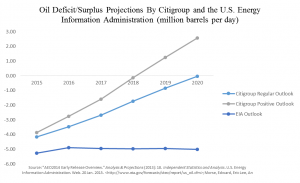SOTU NCPA: The Invisible Hand and Unabated Oil Production
In OPEC’s 2014 World Oil Outlook (WOO), the energy giant projects sustained oil prices of over $100 per barrel for 2015 with slight drops in future oil prices as low as $95 per barrel…
Recent events have proven their short-run projections to be dead wrong.
In his State of The Union (SOTU) Address, President Obama came well-stocked (though certainly not well-received in the new Republican House and Senate) with good economic news which he readily used as ammunition to suppress critics. However, some of these developments, such as descending oil prices, are difficult to assign responsibility to.
What can easily be correlated is oil prices and popularity.
Throughout the night, the President acted triumphant and suave — touting what CNN claims to be above a 50% approval rating — it was as if President Obama came into Congress surfing on America’s wave of cheap oil. However, a sobering realization is that this same wave is what crashed down on President Jimmy Carter’s political career in 1979, as oil prices rose by approximately $60 a barrel, Carter’s approval rating subsequently sank to new depths below 30%.
Though the President is a fundamental player with substantial power in the private arena as well as the public, history has made it clear that the global forces determining supply and demand still reign supreme.
With respect to the agents of supply and demand: Citi’s New York-based investment bank is sounding the alarm that these oil prices may be here to stay, and in an increasing scramble to create economies of scale, there are increasing murmurs of mergers in the American oil and gas industry. Citi’s claims champion innovations such as hydraulic fracturing and horizontal drilling as being the reasons we can expect full oil and gas independence by 2020, if not sooner.
However, these claims are not without skepticism, after the beginning of the U.S. oil and fracking boom, the U.S. Energy Information Administration (EIA) published a more conservative timeline of U.S. oil import balances. Without omission of data and with proper considerations below, the NCPA has juxtaposed the two forecasts for your own judgment:
Important Disclaimers:
- Citigroup’s oil balances study “Energy 2020: Out of America,” was conducted more recently than the EIA’s study, “AEO2014 Early Release Overview.” It is possible that newly available data on the oil and fracking boom made their study more accurate
- Citigroup undoubtedly holds financial claims with its affiliates in the crude oil and natural gas sectors, affiliates who may be looking to repeal the 1975 Energy Policy and Conservation Act, an antiquated government policy barring the export of oil from the U.S. If so, Citigroup has both political and financial motives to overstate growth in domestic oil and gas production
- Likewise, the U.S. Energy Information Administration (EIA) may have strong political pressures to underestimate future domestic production
What is certain however, is that the collateral effects of a sustained increase in American supply would redefine the global environment for businesses and governments:
- Business Insider notes, these low prices make way for the perfect time in which price-distorting subsidies worth billions of dollars could be erased without a major blow to the U.S. economy
- Goldman Sachs and Slate.com assert that a decrease in overall drilling activity, while an increase in its efficiency has already amounted to a $75 billion tax-cut for Americans, a growing figure which they believe will become more valuable in the hands of middle-class Americans rather than in oil companies where much of the revenue may be redirected into the pockets of foreign investors. Similarly, during the SOTU Address, President Obama stated “the typical family this year should save $750 at the pump,” which amounts to a little over $80 billion in savings
- Reuters proclaimed that new permits issued for oil drilling fell by 40% in 2014, a reflection of oil prices… this is a statistic that also represents the trend of unprofitable prospects in exploration, one which may slow the discovery of large oil reserves and distort “peak oil” claims
- During the SOTU Address, President Obama touched upon perhaps the most important point, “we are as free from the grip of foreign oil as we’ve been in almost 30 years.” Indeed, and if Ted Cruz successfully repeals the Energy Policy and Conservation Act, the geopolitical leverage of groups such as OPEC and countries such as Russia would begin to erode in a way we have yet to see, and perhaps permanently

Great content and presentation. Your post reminded me of this 538 article I read last month about recent oil speculation:
http://fivethirtyeight.com/features/the-conventional-wisdom-on-oil-is-always-wrong/
“The Conventional Wisdom On Oil Is Always Wrong”
Hey Jake,
Thank you, the article you posted was also very interesting. American families can only wait and hope that Citigroup is right, and that market power continues being diluted by the boom.